- Home
- Albert Camus
Resistance, Rebellion, and Death Page 15
Resistance, Rebellion, and Death Read online
Page 15
This doubtless explains the odd submissiveness that is customary in the condemned at the moment of their execution. These men who have nothing more to lose could play their last card, choose to die of a chance bullet or be guillotined in the kind of frantic struggle that dulls all the faculties. In a way, this would amount to dying freely. And yet, with but few exceptions, the rule is for the condemned to walk toward death passively in a sort of dreary despondency. That is probably what our journalists mean when they say that the condemned died courageously. We must read between the lines that the condemned made no noise, accepted his status as a parcel, and that everyone is grateful to him for this. In such a degrading business, the interested party shows a praiseworthy sense of propriety by keeping the degradation from lasting too long. But the compliments and the certificates of courage belong to the general mystification surrounding the death penalty. For the condemned will often be seemly in proportion to the fear he feels. He will deserve the praise of the press only if his fear or his feeling of isolation is great enough to sterilize him completely. Let there be no misunderstanding. Some among the condemned, whether political or not, die heroically, and they must be granted the proper admiration and respect. But the majority of them know only the silence of fear, only the impassivity of fright, and it seems to me that such terrified silence deserves even greater respect. When the priest Bela Just offers to write to the family of a young condemned man a few moments before he is hanged and hears the reply: “I have no courage, even for that,” how can a priest, hearing that confession of weakness, fail to honor the most wretched and most sacred thing in man? Those who say nothing but leave a little pool on the spot from which they are taken—who would dare say they died as cowards? And how can we describe the men who reduced them to such cowardice? After all, every murderer when he kills runs the risk of the most dreadful of deaths, whereas those who kill him risk nothing except advancement.
No, what man experiences at such times is beyond all morality. Not virtue, nor courage, nor intelligence, nor even innocence has anything to do with it. Society is suddenly reduced to a state of primitive terrors where nothing can be judged. All equity and all dignity have disappeared. “The conviction of innocence does not immunize against brutal treatment.… I have seen authentic bandits die courageously whereas innocent men went to their deaths trembling in every muscle.”16 When the same man adds that, according to his experience, intellectuals show more weakness, he is not implying that such men have less courage than others but merely that they have more imagination. Having to face an inevitable death, any man, whatever his convictions, is torn asunder from head to toe.17 The feeling of powerlessness and solitude of the condemned man, bound and up against the public coalition that demands his death, is in itself an unimaginable punishment. From this point of view, too, it would be better for the execution to be public. The actor in every man could then come to the aid of the terrified animal and help him cut a figure, even in his own eyes. But darkness and secrecy offer no recourse. In such a disaster, courage, strength of soul, even faith may be disadvantages. As a general rule, a man is undone by waiting for capital punishment well before he dies. Two deaths are inflicted on him, the first being worse than the second, whereas he killed but once. Compared to such torture, the penalty of retaliation seems like a civilized law. It never claimed that the man who gouged out one of his brother’s eyes should be totally blinded.
Such a basic injustice has repercussions, besides, on the relatives of the executed man. The victim has his family, whose sufferings are generally very great and who, most often, want to be avenged. They are, but the relatives of the condemned man then discover an excess of suffering that punishes them beyond all justice. A mother’s or a father’s long months of waiting, the visiting-room, the artificial conversations filling up the brief moments spent with the condemned man, the visions of the execution are all tortures that were not imposed on the relatives of the victim. Whatever may be the feelings of the latter, they cannot want the revenge to extend so far beyond the crime and to torture people who share their own grief. “I have been reprieved, Father,” writes a condemned man, “I can’t yet realize the good fortune that has come my way. My reprieve was signed on April 30 and I was told Wednesday as I came back from the visiting-room. I immediately informed Papa and Mama, who had not yet left the prison. You can imagine their happiness.”18 We can indeed imagine it, but only insofar as we can imagine their uninterrupted suffering until the moment of the reprieve, and the final despair of those who receive the other notification, which punishes, in iniquity, their innocence and their misfortune.
To cut short this question of the law of retaliation, we must note that even in its primitive form it can operate only between two individuals of whom one is absolutely innocent and the other absolutely guilty. The victim, to be sure, is innocent. But can the society that is supposed to represent the victim lay claim to innocence? Is it not responsible, at least in part, for the crime it punishes so severely? This theme has often been developed, and I shall not repeat the arguments that all sorts of thinkers have brought forth since the eighteenth century. They can be summed up anyway by saying that every society has the criminals it deserves. But insofar as France is concerned, it is impossible not to point out the circumstances that ought to make our legislators more modest. Answering an inquiry of the Figaro in 1952 on the death penalty, a colonel asserted that establishing hard labor for life as the most severe penalty would amount to setting up schools of crime. That high-ranking officer seemed to be ignorant, and I can only congratulate him, of the fact that we already have our schools of crime, which differ from our federal prisons in this notable regard: it is possible to leave them at any hour of the day or night; they are the taverns and slums, the glory of our Republic. On this point it is impossible to express oneself moderately.
Statistics show 64,000 overcrowded dwellings (from three to five persons per room) in the city of Paris alone. To be sure, the killer of children is a particularly vile creature who scarcely arouses pity. It is probable, too (I say probable), that none of my readers, forced to live in the same conditions, would go so far as to kill children. Hence there is no question of reducing the culpability of certain monsters. But those monsters, in decent dwellings, would perhaps have had no occasion to go so far. The least that can be said is that they are not alone guilty, and it seems strange that the right to punish them should be granted to the very people who subsidize, not housing, but the growing of beets for the production of alcohol.19
But alcohol makes this scandal even more shocking. It is known that the French nation is systematically intoxicated by its parliamentary majority, for generally vile reasons. Now, the proportion of alcohol’s responsibility in the cause of bloodthirsty crimes is shocking. A lawyer (Maître Guillon) estimated it at 60 per cent. For Dr. Lagriffe the proportion extends from 41.7 to 72 per cent. An investigation carried out in 1951 in the clearing-center of the Fresnes prison, among the common-law criminals, showed 29 per cent to be chronic alcoholics and 24 per cent to have an alcoholic inheritance. Finally, 95 per cent of the killers of children are alcoholics. These are impressive figures. We can balance them with an even more magnificent figure: the tax report of a firm producing apéritifs, which in 1953 showed a profit of 410 million francs. Comparison of these figures justifies informing the stockholders of that firm and the Deputies with a financial interest in alcohol that they have certainly killed more children than they think. As an opponent of capital punishment, I am far from asking that they be condemned to death. But, to begin with, it strikes me as indispensable and urgent to take them under military escort to the next execution of a murderer of children and to hand them on their way out a statistical report including the figures I have given.
The State that sows alcohol cannot be surprised to reap crime.20 Instead of showing surprise, it simply goes on cutting off heads into which it has poured so much alcohol It metes out justice imperturbably and poses as a creditor: its good consc
ience does not suffer at all. Witness the alcohol salesman who, in answer to the Figaro’s inquiry, exclaimed: “I know just what the staunchest enemy of the death penalty would do if, having a weapon within reach, he suddenly saw assassins on the point of killing his father, his mother, his children, or his best friend. Well!” That “well” in itself seems somewhat alcoholized. Naturally, the staunchest enemy of capital punishment would shoot those murderers, and rightly so, without thereby losing any of his reasons for staunchly defending abolition of the death penalty. But if he were to follow through his thinking and the aforementioned assassins reeked of alcohol, he would then go and take care of those whose vocation is to intoxicate future criminals. It is even quite surprising that the relatives of victims of alcoholic crimes have never thought of getting some enlightenment from the Parliament. Yet nothing of the sort takes place, and the State, enjoying general confidence, even supported by public opinion, goes on chastising assassins (particularly the alcoholics) somewhat in the way the pimp chastises the hard-working creatures who assure his livelihood. But the pimp at least does no moralizing. The State does. Although jurisprudence admits that drunkenness sometimes constitutes an extenuating circumstance, the State is ignorant of chronic alcoholism. Drunkenness, however, accompanies only crimes of violence, which are not punished with death, whereas the chronic alcoholic is capable also of premeditated crimes, which will bring about his death. Consequently, the State reserves the right to punish in the only case in which it has a real responsibility.
Does this amount to saying that every alcoholic must be declared irresponsible by a State that will beat its breast until the nation drinks nothing but fruit juice? Certainly not. No more than that the reasons based on heredity should cancel all culpability. The real responsibility of an offender cannot be precisely measured. We know that arithmetic is incapable of adding up the number of our antecedents, whether alcoholic or not. Going back to the beginning of time, the figure would be twenty-two times, raised to the tenth power, greater than the number of present inhabitants of the earth. The number of bad or morbid predispositions our antecedents have been able to transmit to us is, thus, incalculable. We come into the world laden with the weight of an infinite necessity. One would have to grant us, therefore, a general irresponsibility. Logic would demand that neither punishment nor reward should ever be meted out, and, by the same token, all society would become impossible. The instinct of preservation of societies, and hence of individuals, requires instead that individual responsibility be postulated and accepted without dreaming of an absolute indulgence that would amount to the death of all society. But the same reasoning must lead us to conclude that there never exists any total responsibility or, consequently, any absolute punishment or reward. No one can be rewarded completely, not even the winners of Nobel Prizes. But no one should be punished absolutely if he is thought guilty, and certainly not if there is a chance of his being innocent. The death penalty, which really neither provides an example nor assures distributive justice, simply usurps an exorbitant privilege by claiming to punish an always relative culpability by a definitive and irreparable punishment.
If indeed capital punishment represents a doubtful example and an unsatisfactory justice, we must agree with its defenders that it is eliminative. The death penalty definitively eliminates the condemned man. That alone, to tell the truth, ought to exclude, for its partisans especially, the repetition of risky arguments which, as we have just seen, can always be contested. Instead, one might frankly say that it is definitive because it must be, and affirm that certain men are irremediable in society, that they constitute a permanent danger for every citizen and for the social order, and that therefore, before anything else, they must be suppressed. No one, in any case, can refute the existence in society of certain wild animals whose energy and brutality nothing seems capable of breaking. The death penalty, to be sure, does not solve the problem they create. Let us agree, at least, that it suppresses the problem.
I shall come back to such men. But is capital punishment applied only to them? Is there any assurance that none of those executed is remediable? Can it even be asserted that none of them is innocent? In both cases, must it not be admitted that capital punishment is eliminative only insofar as it is irreparable? The 15th of March 1957, Burton Abbott was executed in California, condemned to death for having murdered a little girl of fourteen. Men who commit such a heinous crime are, I believe, classified among the irremediable. Although Abbott continually protested his innocence, he was condemned. His execution had been set for the 15th of March at ten o’clock. At 9:10 a delay was granted to allow his attorneys to make a final appeal.21 At eleven o’clock the appeal was refused. At 11:15 Abbott entered the gas chamber. At 11:18 he breathed in the first whiffs of gas. At 11:20 the secretary of the Committee on Reprieves called on the telephone. The Committee had changed its mind. They had tried to reach the Governor, who was out sailing; then they had phoned the prison directly. Abbott was taken from the gas chamber. It was too late. If only it had been cloudy over California that day, the Governor would not have gone out sailing. He would have telephoned two minutes earlier; today Abbott would be alive and would perhaps see his innocence proved. Any other penalty, even the harshest, would have left him that chance. The death penalty left him none.
This case is exceptional, some will say. Our lives are exceptional, too, and yet, in the fleeting existence that is ours, this takes place near us, at some ten hours’ distance by air. Abbott’s misfortune is less an exception than a news item like so many others, a mistake that is not isolated if we can believe our newspapers (see the Deshays case, to cite but the most recent one). The jurist Olivecroix, applying the law of probability to the chance of judicial error, around 1860, concluded that perhaps one innocent man was condemned in every two hundred and fifty-seven cases. The proportion is small? It is small in relation to average penalties. It is infinite in relation to capital punishment. When Hugo writes that to him the name of the guillotine is Lesurques,22 he does not mean that all those who are decapitated are Lesurques, but that one Lesurques is enough for the guillotine to be permanently dishonored. It is understandable that Belgium gave up once and for all pronouncing the death penalty after a judicial error and that England raised the question of abolition after the Hayes case. It is also possible to understand the conclusions of the Attorney General who, when consulted as to the appeal of a very probably guilty criminal whose victim had not been found, wrote: “The survival of X … gives the authorities the possibility of examining at leisure any new clue that might eventually be brought in as to the existence of his wife.23 … On the other hand, the execution, by canceling that hypothetical possibility of examination, would, I fear, give to the slightest clue a theoretical value, a power of regret that I think it inopportune to create.” A love of justice and truth is expressed here in a most moving way, and it would be appropriate to quote often in our courts that “power of regret” which so vividly sums up the danger that faces every juror. Once the innocent man is dead, no one can do anything for him, in fact, but to rehabilitate him, if there is still someone to ask for this. Then he is given back his innocence, which, to tell the truth, he had never lost. But the persecution of which he was a victim, his dreadful sufferings, his horrible death have been given him forever. It remains only to think of the innocent men of the future, so that these tortures may be spared them. This was done in Belgium. In France consciences are apparently untroubled.
Probably the French take comfort from the idea that justice has progressed hand in hand with science. When the learned expert holds forth in court, it seems as if a priest has spoken, and the jury, raised in the religion of science, expresses its opinion. However, recent cases, chief among them the Besnard case, have shown us what a comedy of experts is like. Culpability is no better established for having been established in a test tube, even a graduated one. A second test tube will tell a different story, and the personal equation loses none of its importance in such dange
rous mathematics. The proportion of learned men who are really experts is the same as that of judges who are psychologists, hardly any greater than that of serious and objective juries. Today, as yesterday, the chance of error remains. Tomorrow another expert testimony will declare the innocence of some Abbott or other. But Abbott will be dead, scientifically dead, and the science that claims to prove innocence as well as guilt has not yet reached the point of resuscitating those it kills.
Among the guilty themselves, is there any assurance that none but the irretrievable have been killed? All those who, like me, have at a period of their lives necessarily followed the assize courts know that a large element of chance enters into any sentence. The look of the accused, his antecedents (adultery is often looked upon as an aggravating circumstance by jurors who may or may not all have been always faithful), his manner (which is in his favor only if it is conventional—in other words, play-acting most of the time), his very elocution (the old hands know that one must neither stammer nor be too eloquent), the mishaps of the trial enjoyed in a sentimental key (and the truth, alas, is not always emotionally effective): so many flukes that influence the final decision of the jury. At the moment of the death verdict, one may be sure that to arrive at the most definite of penalties, an extraordinary combination of uncertainties was necessary. When it is known that the supreme verdict depends on the jury’s evaluation of the extenuating circumstances, when it is known, above all, that the reform of 1832 gave our juries the power of granting indeterminate extenuating circumstances, it is possible to imagine the latitude left to the passing mood of the jurors. The law no longer foresees precisely the cases in which death is to be the outcome; so the jury decides after the event by guesswork. Inasmuch as there are never two comparable juries, the man who is executed might well not have been. Beyond reclaim in the eyes of the respectable people of Ille-et-Vilaine, he would have been granted a semblance of excuse by the good citizens of the Var. Unfortunately, the same blade falls in the two Départements. And it makes no distinction.

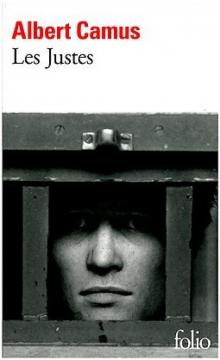 Les Justes
Les Justes The Sea Close By
The Sea Close By The Stranger
The Stranger The Rebel: An Essay on Man in Revolt
The Rebel: An Essay on Man in Revolt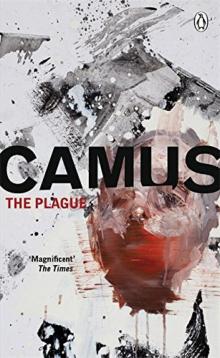 The plague
The plague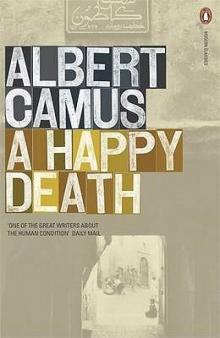 A Happy Death
A Happy Death The Myth of Sisyphus and Other Essays
The Myth of Sisyphus and Other Essays The Fall
The Fall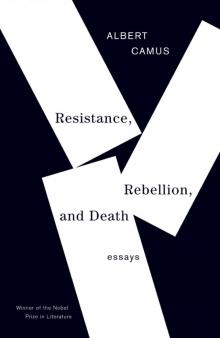 Resistance, Rebellion, and Death
Resistance, Rebellion, and Death The First Man
The First Man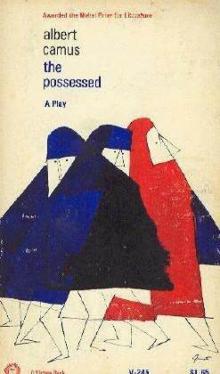 The Possessed
The Possessed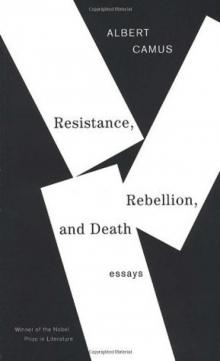 Resistance, Rebellion and Death: Essays
Resistance, Rebellion and Death: Essays